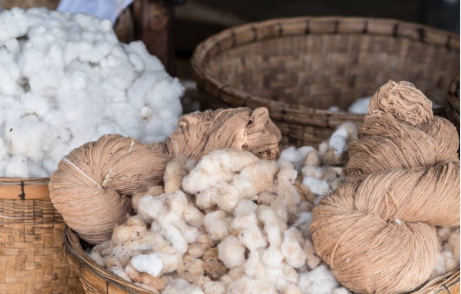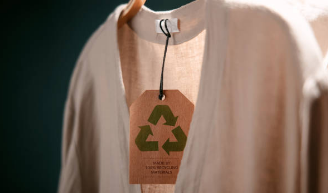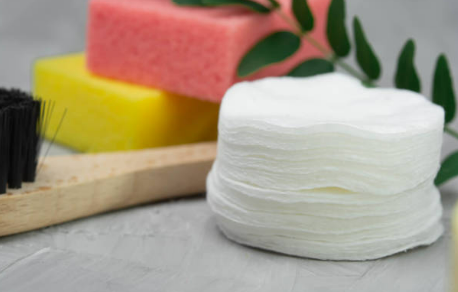Discover how organic cotton and sustainable textiles has evolved across the fashion supply chain from farming through the supply chain by 2024. Learn how organic cotton farming can help in making the environment healthy, fabrics and clothing healthier and ethical fashion. Understand the different methods of farming of Organic cotton including the conventional as well as modern methods used in large scale cultivation. It is crucial to know the advantages that encompass consumers, farmers, and the environment due to the use of organic cotton. It’s time to discover the beautiful scenery of the organic cotton apparel and organic textiles and their impact on the future of sustainable fashion.
What is Organic Cotton?

Organic cotton is a cotton grown using eco-friendly methods of farming like crop rotation method, use organic manure, integrating biological control method to deal with pests among others, which makes organic fiber farming process to be sustainable. Certification standards aim at the ensuring that organic cotton is far from being produced with the help of GMOs and that labor relations are not contravene some recognized principles and norms. Due to the application of environmental aspects and strategies together with social responsive measures, organic cotton is a healthier option compared to the conventional normal cotton products.
Organic Cotton Production Method
The Organic Cotton Production Method is a method of approach to producing or growing of organic cotton entailing the use of proper practices that are environmentally friendly, socially acceptable, and quality produce.
Key features of the certified organic cotton and production process and method include:
- Seed Selection: Organic cotton starts with the appropriate selection of seeds from non-genetically modified organisms and reduces anti-biotic and pesticide resistance in the field.
- Soil Management: Crop rotation, use of organic manure or compost and other such techniques are used under natural farming to keep the soil healthy and fertile avoiding chemical fertilizers.
- Pest and Weed Control: Unlike conventional farming, sustainable agriculture utilizes methods such as pest and weeds friendly habitat and cultivation of different crops in a sequential and manual removal of weeds respectively.
- Water Conservation: Use of water conserving measures like drip irrigation system, rain water harvesting system and moisture content control system help a lot in saving water.
- Harvesting: Organic cotton is often hand-picked to avoid undue stress to the fibers & for preserving the quality of the final product.
- Processing: Organic cotton processing, right from ginning to spinning and weaving, does not harm the environment or pollute the nature by using any hazardous chemicals.
- Dyeing and Finishing: Following the production of organic cotton textiles, items are dyed only with natural or low impact dyes finishing processes and the processes that are taken in the production lines are taken with the least environmental impact on human health.
Common Products That Uses Organic Cotton
Organic cotton is used in organic production of many commodities ranging from apparels to household items within the various industries. Some common products that often incorporate organic cotton include organic fiber products:
Apparel and Clothing: Organic cotton is mostly applied in textile line, apparel products like t-shirts, jeans, dresses, shirts, underwear, socks, and formal wears. As many already addressed, several brands include organic cotton clothes in their list of Sustainable fashion products.

Bedding and Linens: Organic cotton is widely used in the household items such as bedsheets, pillow covers, duvet, blankets and even in towels among others. These products are most demanded for their soft and breathe ability, besides they are environmentally friendly.

Baby and Children’s Clothing: Organic cotton is preferred in baby and kids’ products since it is soft on the skin and does not cause allergies. Clothes like onesies, pajamas, rompers, bibs, and blankets produced from organic cotton are the most popular within parents who want no-nasty stuff for their children.

Personal Care Products: Organic cotton is occasionally incorporated in products that are employed in personal hygiene including cotton wool filter papers, cotton buds (Q-tips), and cotton wool. These are usually produced from organic cotton so that to reduce on contact with pesticides and other compounds present in normal cotton.

Home Textiles: Organic cotton is utilized in many of the fabrics used in homes such as curtains, upholstery, rugs, and table cloths among others. These products are ideal in encouraging a green option as people decorate their homes and procure furniture.

Reusable Bags and Totes: The majority of reusable bags and totes, that is shopper handbags, are made from organic cotton than from other materials such as plastic.

Athletic and Activewear: Some athletic and activewear brands incorporate organic cotton into their designs, and products that they make, these include workout tops, leggings, sports bras, and sweatshirts. The organic cotton has attributes such as comfort, breathability, and moisture control that are ideal for an active wear line.

Accessories: Organic cotton is also applied to the production of accessories like, head wears that include caps and hats, scarves, mufflers, gloves, stockings or socks, and other fashion accessories like belts.

Is Organic Cotton Sustainable?
Organic cotton is often among organic crops considered more sustainable than conventional cotton due to several factors:
- Reduced Chemical Use: Organic cotton farming does not allow the use of inorganic chemicals such as pesticide, herbicides and fertilizers. It reduces the contribution to pollution on the soils and water as well as the impacts on social health of the farming communities and workers.
- Soil Health: Organic cotton cultivation involves the use of methods of soil maintenance including intercropping, cover cropping and use of compost among others.
- Water Conservation: and though the cultivation of cotton is known to consume a lot of water, organic farming takes time to practice techniques of water conservation these being mulching, drip irrigation and even rain water conservation.
- Biodiversity Preservation: It is environmentally friendly since it protects the fertility of the soils besides supporting the status of the beneficial insects, birds, and other wildlife as the techniques of organic farming do not incorporate the use of synthetic chemicals.
- Climate Resilience: Some organic farming practices including agroforestry and carbon sequestration such as soil organic matter had the possibilities to adapt and mitigate the effects of climate change and shocks such as extreme weather event.
- Social Considerations: Organic cotton includes the social side of people’s welfare embracing fair trade, community and small holder farmer support. Thus, besides the environmental aspects, the organic cotton campaigns also speak of social sustainability by fostering fair trade and supporting the farming communities.
Difference Between Organic Cotton compared to Conventional Cotton
Organic cotton fibre and all other conventional cotton are quite dissimilar when it comes to the methods of farming, the effects on environment and social factors. Here are the key differences between the organic cotton market and two:
Cultivation Methods
- Organic Cotton: Organic cotton is a type of cotton produced through methods that do not involve conventional chemicals such as synthetic chemicals or fertilizers or GMOs. Crop rotation, composting and Integrated Pest Management are some of the techniques used that helps farmers in soil health and fertility.
- Conventional Cotton: Cotton farming that has been practiced for many decades globally entails the applications of several synthetic pesticides, herbicides and fertilizers. GM cotton is grown to be pest-resistant to bolster production among other uses.
Environmental Impact
- Organic Cotton: It is used as a fabric and Organic cotton also has tremendous benefits for the environment as it helps in creating better; biodiversity, healthy soils and water conservation. It stops the use of synthesized chemicals hence leading to solutions such as pollution, erosion, and water pollution.
- Conventional Cotton: The conventional methods of growing of cotton crop leads to various negative effects on the environment through the use of dangerous chemicals and water on the crop.
Social Considerations
- Organic Cotton: Organic cotton production also focuses on other social aspects relating to labor; the treatments of workers, wages paid, and the ability to empower the community. Concerning the social responsibility, an interest can be attached to the norms of certification like Fair Trade and the Global Organic Textile Standard (GOTS).
- Conventional Cotton: Organic cotton cultivation excludes the use of slavery and bestows inadequate wages, health risks, and exposure to hazardous chemicals to the organic cotton farmers and workers.
Product Quality and Safety
- Organic Cotton: Since organic cotton homemade products are not contaminated with any synthetic chemical residues, the final products are hypoallergenic, sensitive skin friendly and friendly to the environment.
- Conventional Cotton: Ordinary cotton based products may include residual pesticides, herbicides, and other agro-chemicals that are detrimental to human skin and can cause skin rashes or itching.
What is Global Organic Textile Standards (GOTS)?
The Global Organic Textile Standard (GOTS) is a global textile exchange industry standard for organic fabrics which is aimed at making sure that all the products and processes conform to the highest environmental and social standards in the supply chain. Developed to provide assurance of organic nature of the fabrics, GOTS has laid down rule that said that 70% of the fabric should contain certified organic fibers and the residual components have restricting regulations on use of harmful chemicals and processes. From the call for raw material up to what is socially and environmentally friendly manner of manufacturing as well as accurate labeling, GOTS serves as consumers’ guide in ensuring that textile products are really organic.
What is Organic Trade Association?
The Organic Trade Association or OTA is a trade organization that is based in North America and operates as the voice of the organic industry in its region. OTA’s aim is to encourage and safeguard the growth of trade in organics for the benefit of the environment, the growers, the consumers, and the nation. OTA describes the efficacious organic products to become one of the prominent parts of human lives and the external world. OTA is an affiliation of the businesses involved in the supply chain of the Organic trade and has something to do with the concept of organic products encompassing food, organic fiber/textiles, personal care products and new categories as they emerge.
What social benefits does organic cotton production offer for farmers and local communities?
Organic cotton production can bring several social benefits to both organic producers, cotton farmers and local communities:
- Healthier Working Conditions: Hence, the cultivation of organic cotton can be done naturally without synthetic chemicals or pesticides.
- Improved Livelihoods: Thus, shifting to organic cotton farming may be beneficial to the farmers because they can sell their crops at higher prices because of the perceived value of organic textiles.
- Preservation of Ecosystems: Sustainable agriculture involves the use of environmentally friendly methods of production which include the use of organic manure, proper crop dynamics, natural pest control among others. This obviously assists in retaining the soil fertility, biological diversity as well as the ecosystems which may in the long run benefit the agricultural societies.
- Water Conservation: In general, techniques used in organic agriculture use limited water as compared to conventional agriculture techniques since the emphasis if placed on soil health and water holding capacity of the soil.
- Empowerment and Education: The cultivation of organic cotton requires farmer’s training and farming education on the recommended practices to undertake. This equips them with a knowledge and skills which enable them to increase their productivity and sustainability without degrading the environment.
- Community Development: Farming with organic cotton can play its role in enhancing the community development agendas as it supports local people’s participation, promotes the formation of urge cooperatives, and supports small growers in particular.
- Market Access and Fair Trade: Some cotton based projects linked with sustainable agriculture include the usage of fair trade which prescribes that farmers should be paid genuine prices for their crops.
Is Organic Cotton Better for the Environment?
Organic cotton is generally considered better for the environment compared to organic cotton products to conventional cotton for several reasons:
- Reduced Chemical Use: Conventional agriculture farming method of growing organic cotton does not allow the use of synthetic pesticides, herbicides, and fertilizer. They are undesirable to the soil health, water, and other forms of life in and around the given areas. In this regard, it is in a position to prevent the depletion of soil, water and other resources in the ecosystem through the abstaining the use of the normal synthetic fibers and engaging in organic cotton farming.
- Soil Health: Activities like crop rotation, establishing cover crops and composting helps in keeping and improving health of the soil. The practice results in healthy soils and as a consequence they are able to conserve water, resist erosion and support the health microbial communities hence increase on ecosystem health.
- Water Conservation: Overall it may be seen that organic cotton farming is relatively more bargaining in water but in actual method of cultivation it prefers water efficient technologies like mulching, drip irrigation, rain water harvesting etc.
- Biodiversity Preservation: Sustainable agriculture practices increase the population density of beneficial insects, birds, and all the other wildlife that are influenced by the environment in different ways.
- Reduced Carbon Footprint: It has been noted also that in many ways, specific sustainable agriculture practices are associated with lesser carbon emissions than the conventional practices. Thus, due to the non-use of synthetic fertilizers and Pesticides which is derived from fossil fuels and regularly practicing carbon sequestering activities such as cover cropping, and implementing agroforestry in growing organic cotton can reduce climate change.
- Healthier Communities: Organic cotton farming also has the effect of limiting the amounts of dangerous chemicals and toxins to which the farmers, workers and those in surrounding areas are subjected to by virtue of conventional farming practices.
Conclusion
Organic cotton presents the consumers with the characteristics of being eco-friendly and brings pros to farmers as well as to other stakeholders. It is a biodegradable product that contributes to organic production systems replenish good health for plants, reduction of water use, and promotes the conservation of natural ecosystem through the use of Non GMO seeds in growing organic cotton. Also, organic cotton is beneficial for fair treatment of workers and empowers rural people since it offers of more better chances of getting employed. With the increasing awareness regarding sustainable textile products and their consumption, organic cotton is in the forefront in the transformation of a new sustainable fashion system.
